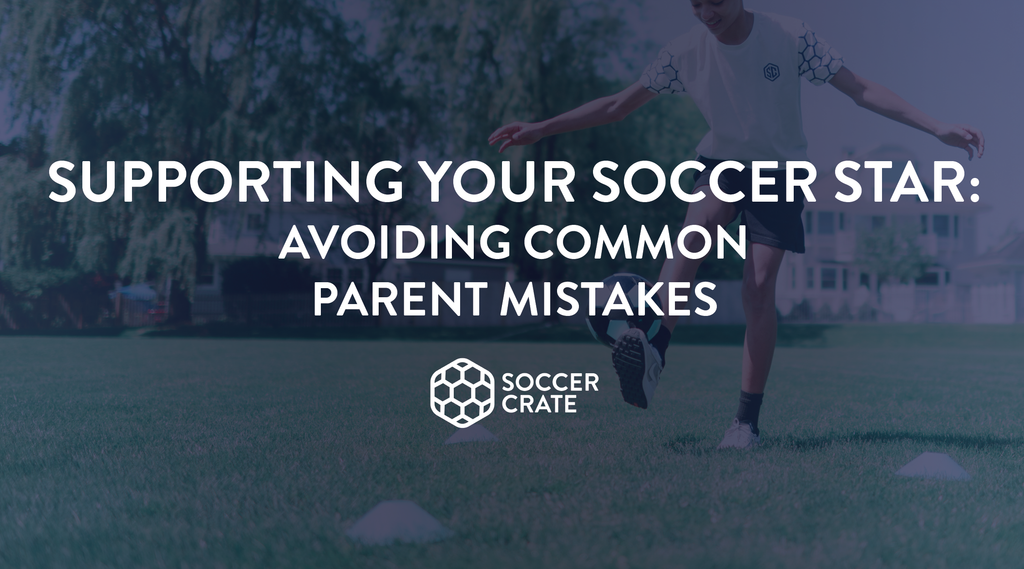In the world of youth soccer, parents play a crucial role in supporting their child's development. However, there are many common mistakes that parents can unintentionally make that hinder their child's progress.
By understanding what to avoid, encouraging mistakes, and practicing effective communication, parents can ensure that their child's soccer journey is a positive and enriching experience. In youth soccer, it is essential for parents to be aware of the common mistakes that can hinder their child's progress.
One crucial aspect is encouraging mistakes. It may seem counterintuitive, but allowing children to make mistakes on the field is vital for their growth and development. By refraining from criticism and instead focusing on the learning opportunities that mistakes present, parents can foster a growth mindset in their child and help them develop resilience and problem-solving skills.
 Additionally, effective communication between parents, coaches, and players is essential for a positive soccer experience. Parents should strive to maintain open lines of communication with their child's coach, seeking their guidance and expertise rather than attempting to coach from the sidelines.
Additionally, effective communication between parents, coaches, and players is essential for a positive soccer experience. Parents should strive to maintain open lines of communication with their child's coach, seeking their guidance and expertise rather than attempting to coach from the sidelines.
By following these guidelines, parents can provide the necessary support for their soccer star to thrive and avoid common mistakes that may hinder their progress.
What to Avoid
One common mistake that soccer parents should avoid is not tolerating their child's mistakes, as failure is important for learning and development.
It is natural for parents to want their children to succeed and excel in soccer, but it is crucial to understand that making mistakes is a part of the learning process. When parents do not tolerate their child's mistakes, it can create an atmosphere of fear and anxiety, where children are afraid to take risks or try new techniques. This fear of disappointing their parents or coach can hinder their progress and prevent them from reaching their full potential.
Handling disappointment is another aspect that soccer parents should be mindful of. It is important for parents to acknowledge and accept that their child will experience setbacks and failures in soccer. Instead of being overly critical or focusing on the negatives, parents should provide support and encouragement during these challenging times. By fostering a positive and supportive environment, parents can help their children develop resilience and the ability to bounce back from disappointments. This will not only benefit their soccer development but also teach them valuable life skills such as perseverance and determination.
Furthermore, fostering independence is crucial for the overall growth and development of young soccer players. Parents should resist the temptation to fight their child's battles for them or approach the coach with every problem or concern. Encouraging children to have open discussions with their coach themselves empowers them to take ownership of their soccer journey. By doing so, children learn to communicate effectively, advocate for themselves, and develop problem-solving skills. Additionally, coach's feedback and guidance can be instrumental in helping children improve their skills and performance on the field.
Ultimately, by avoiding the mistake of not tolerating mistakes, handling disappointment, and fostering independence, soccer parents can support their child's soccer development in a positive and effective manner.
Encouraging Mistakes
An important aspect of fostering a growth mindset in young soccer players involves creating an environment where mistakes are encouraged and seen as opportunities for learning and development.
 It is common for kids to be afraid of making mistakes because they fear disappointing their parents or coaches. However, it is crucial for parents to understand that failure is an essential part of the learning process.
It is common for kids to be afraid of making mistakes because they fear disappointing their parents or coaches. However, it is crucial for parents to understand that failure is an essential part of the learning process.
By encouraging their child to try new techniques and skills, even if they fail initially, parents can help build their child's confidence and resilience.
When parents tolerate mistakes and avoid criticizing their child's performance, they create a safe space for them to take risks and learn from their errors. This approach fosters a growth mindset, where children understand that mistakes are not failures but rather stepping stones towards improvement.
By acknowledging when their child tries new skills, parents can reinforce the idea that taking risks and learning from mistakes is a valuable part of their soccer journey.
By fostering growth and building confidence through encouraging mistakes, parents can support their child's soccer development and help them reach their full potential.
Effective Communication
Effective communication is essential for fostering a positive and supportive environment in youth soccer development. Parent involvement plays a crucial role in the overall experience of young soccer players, and establishing an open dialogue between parents, coaches, and players can greatly contribute to their growth and development.
When parents effectively communicate with their child's coach, they can gain a better understanding of their child's progress, areas for improvement, and goals for the future. This open dialogue allows parents to provide the necessary support and encouragement to their child, while also being aware of any challenges or concerns that may arise.
Furthermore, effective communication between parents and coaches can help create a unified front in supporting the young soccer player. By understanding the coach's training methods and philosophy, parents can reinforce the same messages and values at home. This consistency helps the young player feel supported and allows them to fully immerse themselves in their soccer journey.
Additionally, open communication provides an opportunity for parents to express any concerns or questions they may have, ensuring that everyone is on the same page and working towards the same goals.
Overall, effective communication between parents, coaches, and players is vital for creating a positive and supportive environment that enhances the youth soccer experience and promotes the development of young athletes.



